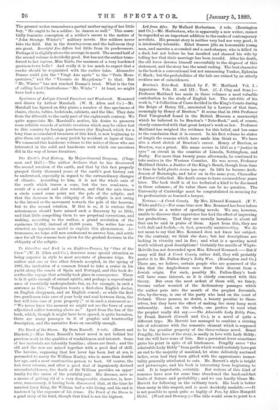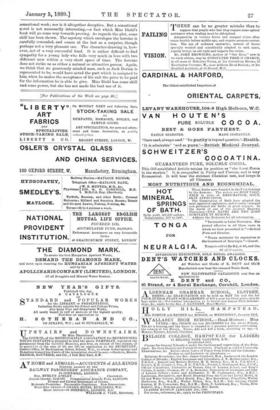NOVELS.-A Crack County. By Mrs. Edward Kennard. (F. V. White
and Co.)—For some time now Mrs. Kennard has been before the public as a writer of sporting novels. We are, however, unable to discover that experience has had the effect of improving her productions. That they are morally harmless is about all' that can be said in praise of them. Apart from this, they are both dull and foolish,—in fact, generally uninteresting. We do not mean to say that Mrs. Kennard does not know her subject. On the contrary, we think she does ; but her descriptions are lacking in vivacity and in fire ; and what is a sporting novel worth without good descriptions ? Certainly the mantle of Whyte- Melville has not descended upon Mrs. Edward Kennard.—But if many will find A Crack County rather dull, they will probably prefer it to Mr. Pullen-Bury's Nobly Won. (Remington and Co.) There are, we believe, certain people who are possessed of the idea that the Anglo-Saxon race draw their descent from a Jewish origin. For such, possibly Mr. Pullen-Bury's book will have some interest, as it is chiefly concerned with this theory. But even the most ardent of them will, we fancy, become rather wearied of the declamatory passages which the author puts into the mouth of the prophet Jeremiah, who, by-the-way, is one of the party who land on the coast of Ireland. These possess, no doubt, a beauty peculiar to them- selves, but they have the effect of making the story hang most unbearably. And, on the whole, one prefers to read what the prophet really did say.—The Admirable Lady Biddy Pane,. by Frank Barrett (Cassell and Co.), is a novel of quite a different type. Mr. Barrett has managed to combine a stirring tale of adventure with the romantic element which is supposed to be the peculiar property of the three-volume novel. Benet Pengilly, the hero of the story, is madly in love with Lady Biddy; but she will have none of him. But a persistent lover sometimes gains his point in spite of all hindrances. Pengilly saves "the admirable Lady Biddy" from perils which would certainly have put an end to the majority of mankind, let alone delicately nurtured ladies, even had they been gifted with the approximate immor- tality generally attributed to cats. Mr. Barrett's style is bright and picturesque, and his book is interesting from beginning to end. It is improbable, certainly. But writers of this kind of romance have now for some time abandoned the hard-and-fast limits of Nature and probability ; and we can hardly blame Mr. Barrett for following in the ordinary track. His book is better than many in this respect, and is most decidedly readable.—It is not possible to speak quite so highly of Fire, by Alice Mangold Diehl. (Ward and Downey.)—The title would seem to point to a
sensational work ; nor is it altogether deceptive. But a sensational novel is not necessarily interesting,—a fact which Miss Diehl's book will go some way towards proving. As regards the plot, some skill has been shown. The mystery which envelopes the heroine is carefully concealed, and comes at the last as a surprise, though perhaps not a very pleasant one. The character-drawing is, how- ever, not of a very successful kind. It is rather difficult to find sympathy for a young lady who falls very much in love with two different men within a very short space of time. The heroine doss not strike us as either a natural or attractive person. Again, we think that no generously minded man, such as Jack Dorian is represented to be, would have acted the part which is assigned to him, when he makes the acceptance of his suit the price to be paid for the information he is able to give. Miss Diehl has some skill and some power, but she has not made the best use of it.















































 Previous page
Previous page